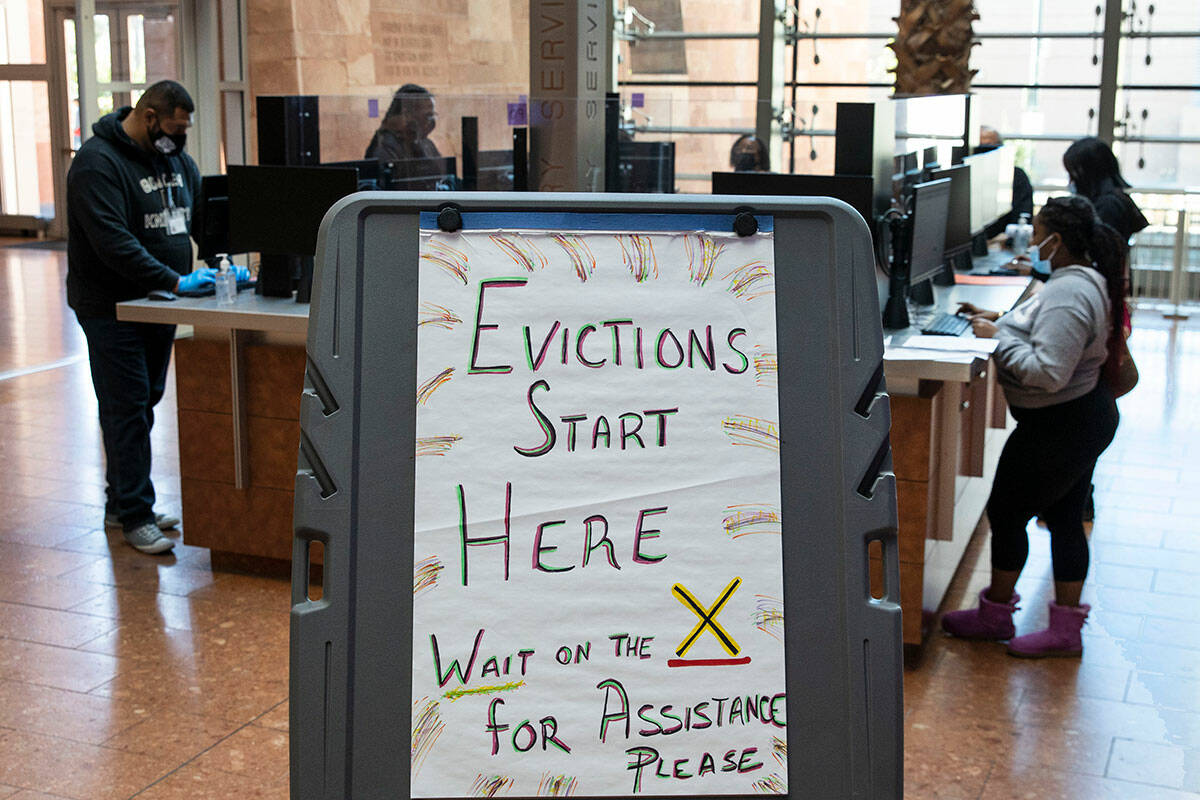What should you do if you get evicted in Las Vegas?
Tenants and renters should know their legal rights as the judicial system is clearly weighted towards landlords in Nevada, according to a top eviction lawyer.
Calder Gabroy, who called Las Vegas’ high eviction rate a “beast of a problem,” added that the onus falls on the tenant if they are served an eviction notice, so it’s best to seek out information or legal advice as soon as the notice is received.
“So say it’s a nonpayment of rent, it might be seven days, it just depends on what kind of notice they give but a lot of times tenants are not aware of the fact that they then actually have to make a filing in court,” he said. “So if the landlord files and there is no response from the tenant within the time frame, they’re out.”
Las Vegas has one of the highest eviction rates in the country, according to Princeton’s Eviction Lab, with the seventh highest eviction filing rates out of the 34 metros they track.
From March 2020 through August 2024, there were 190,133 eviction filings in Clark County, a 21 percent increase from pre-pandemic levels. Through August of this year, there were 51,782 filings, a 42 percent increase from the same period last year. In August alone, there were 4,041 filings, a 25 percent increase from a normal month prior to the pandemic.
There are about 370,204 renter households in Clark County, and the typical rent is $1,325 a month. Landlords have to provide tenants seven days notice and file a $71 filing in the courts, which are some of the lowest and quickest rates of any of the county’s tracked, according to Eviction Lab.
Gabroy said there is also a lower threshold for who can represent a property management company in eviction court, and this means it’s a lot easier for a landlord to file an eviction because they don’t have to hire a lawyer to represent them.
“Anytime you go to court and there is a corporation that is involved, they’re required to have a lawyer there to represent them. But eviction court is different, they can actually just have an agent,” he said. “And so the overall problem is people don’t know what to do, they get the notice, they’re not legally trained, it’s a lightning fast process where they’re at risk of losing their homes and so it’s very difficult for anybody who is facing that.”
Eviction diversion program
Clark County set up an eviction diversion program with a $1.2 million grant from the National Center for State Courts’ Eviction Diversion Initiative that kicked off in November 2022.
According to statistics provided by Clark County to the Las Vegas Review-Journal, between December 2023 and July of this year, the program was able to get 686 eviction cases out of 1,151 (77 percent) referred, dismissed or denied.
Las Vegas finds itself in the middle of a housing crisis as rising rents are pushing the city’s most vulnerable to the edge at an ever-growing rate. Gabroy said on top of it all, there are no rent controls, which means sometimes an eviction is simply a greedy ploy from a landlord preying on a tenant’s lack of education.
“When a landlord gets somebody out (in Las Vegas), they almost always charge more because a lot of times the landlord is going to do a lot better if they can get the person evicted, so we really need to put in some statutory protections that level the playing field.”
Evictions by the numbers
Eviction Lab pulls data from the Las Vegas Justice Court, North Las Vegas Justice Court and the Henderson Justice Court along with the Supreme Court of Nevada’s annual report.
Evictions in Clark County hit a high-water mark in December 2022 as filings were up 82 percent from the pre-COVID average, and the lab’s website explained the local market has been on a roller coaster like much of the country the past few years.
“Eviction filings in Las Vegas fell sharply by March 2020,” reads the report. “The state of Nevada put in place a moratorium on eviction proceedings from late-March until mid-October 2020. After the expiration of these protections, eviction filings rose. The state then implemented a second moratorium in December 2020 for tenants who affirmed that they had been financially affected by COVID-19 or would be made homeless by eviction. Those protections expired at the end of May 2021.”
Contact Patrick Blennerhassett at pblennerhassett@reviewjournal.com.


















